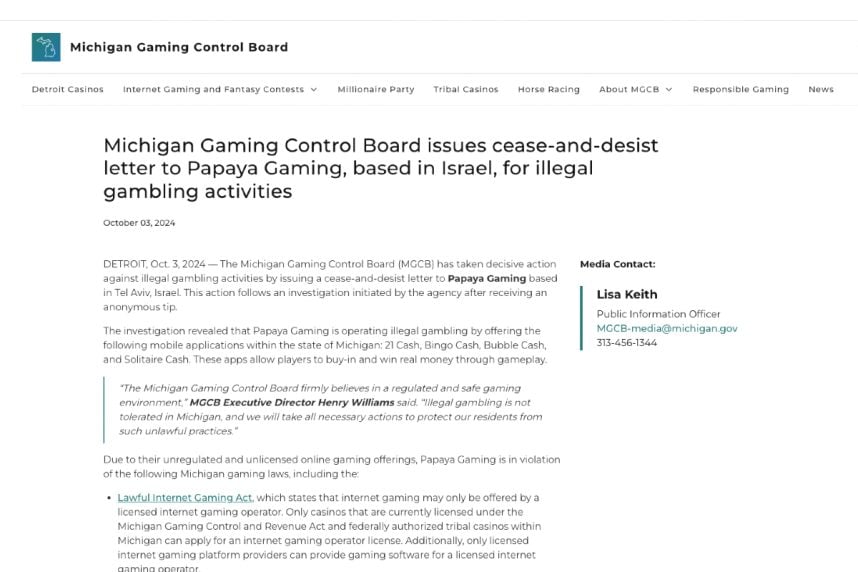Date: October 3, 2024, 12:25h.
Last updated on: October 3, 2024, 12:25h.
On Thursday, the Michigan Gaming Control Board (MGCB) ordered a prominent online provider of supposed peer-to-peer skill gaming contests to halt operations in the state.

Israel-based Papaya Gaming states to operate skill games on its mobile applications. Players place bets before competing against each other in games like Solitaire Cash, Bubble Cash, Bingo Cash, and 21 Cash.
Papaya has been accused of using computer bots by rival Skillz. A class-action lawsuit filed against Papaya by unhappy customers made similar allegations.
The MGCB announced today that an internal investigation of the Papaya mobile platform was launched after receiving an anonymous tip expressing concerns that the online gaming company was violating Michigan’s gambling laws. The probe concluded that Papaya is conducting illegal gambling by offering its supposedly skill-based products.
The Michigan Gaming Control Board strongly believes in a regulated and secure gaming environment,” said MGCB Executive Director Henry Williams. “Illegal gambling is not accepted in Michigan, and we will take all necessary measures to safeguard our residents from such unlawful practices.”
In its cease-and-desist order to Papaya, the gaming regulatory body stated that the mobile gaming company must exit the state within 14 days or face legal consequences.
Unlawful Gaming
Michigan gaming regulators indicated that the evidence demonstrated Papaya’s business violated the Michigan Gaming Control and Revenue Act and the Michigan Penal Code. An individual who operates an unlicensed gambling operation in Michigan could face a felony penalty of up to 10 years in prison and fines of up to $100,000.
Papaya denies the claims that it uses computer bots or is a gambling operator. In a statement to Casino.org in August, the company alleged that Skillz is conducting a smear campaign against its competitors.
“Skillz has engaged in a series of tortious and deceitful behaviors. The counterclaims describe how— with its business performing poorly— Skillz initiated a deceptive campaign against Papaya by falsely asserting that Skillz is a righteous advocate for fairness while accusing others of engaging in the same type of deceitful conduct they are practicing themselves. That conduct is the pinnacle of hypocrisy,” the statement read.
Skillz’s federal lawsuit against Papaya is ongoing in New York’s Southern District. Another Skillz lawsuit against Paris-based Voodoo Gaming also remains active in the same federal court.
Lawyers for Papaya and Voodoo, a representative speaking on behalf of Skillz informed Casino.org, are attempting “to protect themselves with the law of foreign countries.”
“They are employing different strategies, but ultimately, both are hiding behind foreign law to evade disclosing their actions,” the public relations officer stated.
Competitors Remain Active
Casino.org reached out to the MGCB for clarification on whether AviaGames, another supposed peer-to-peer skill gaming network that has encountered similar legal scrutiny from Skillz and consumers in recent times, but did not receive a response as this report was published. Voodoo’s operations also continue in Michigan.
Skillz, based in Las Vegas, was a trailblazer in the online head-to-head skill gaming sector. Established in 2012, Skillz has evolved into a business-to-business service provider that provides its patented “software development kit” (SDK) to skill gaming mobile game developers like Papaya and Avia.
In February, a federal jury in California’s Northern District Court instructed Avia to compensate Skillz $42.9 million for willful violation of the SDK. Skillz successfully argued that Avia had altered the SDK to enable “historical playthroughs.” A juror informed Casino.org that the jury believed the term “historical playthrough” was coined by Avia solely for its legal defense.
Avia contended that it did not employ bots but instead enhanced player pairing times by utilizing a player’s previous gameplay for a new game. The jury concluded that “historical playthroughs” was code for bots within Avia’s operations.


